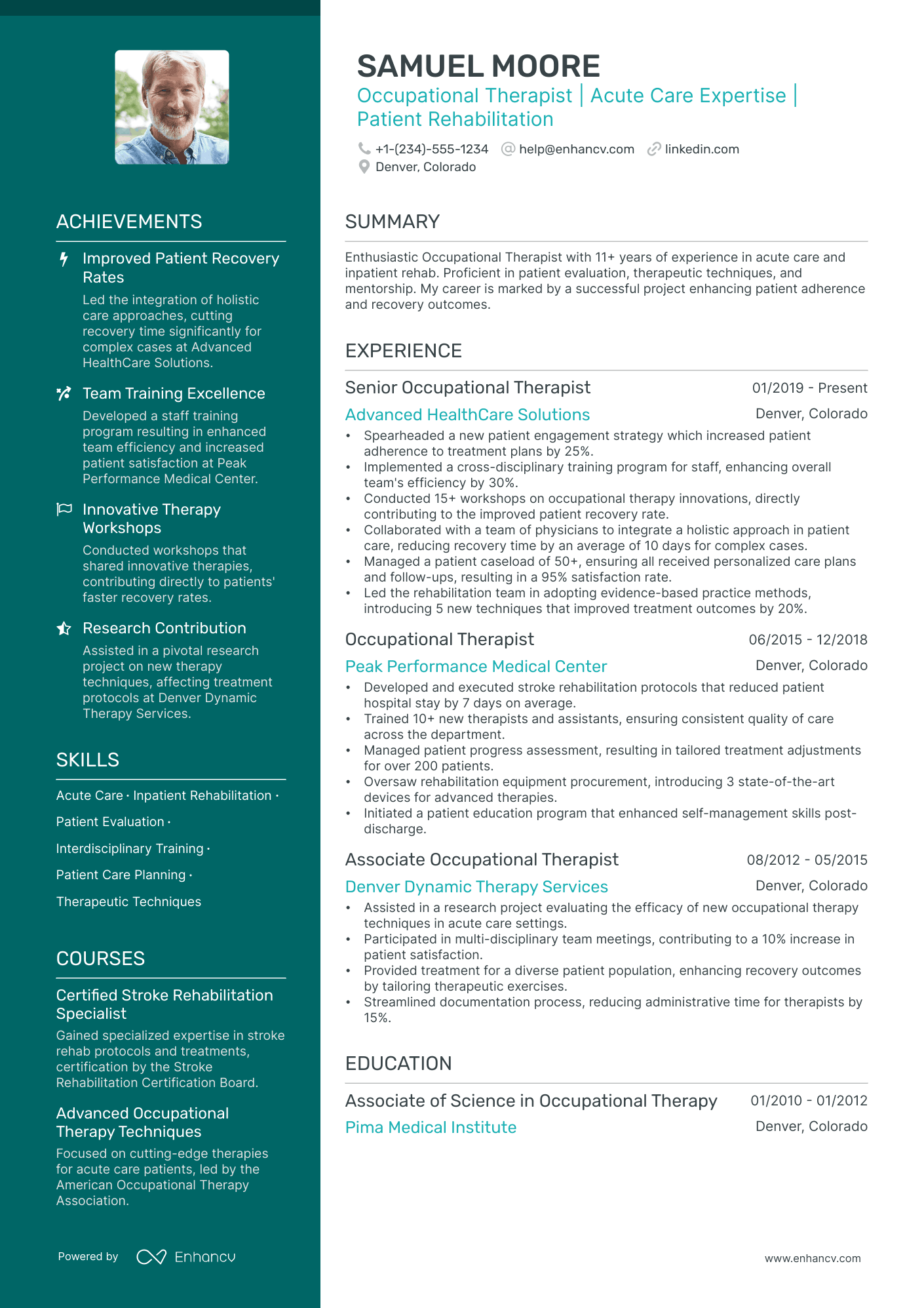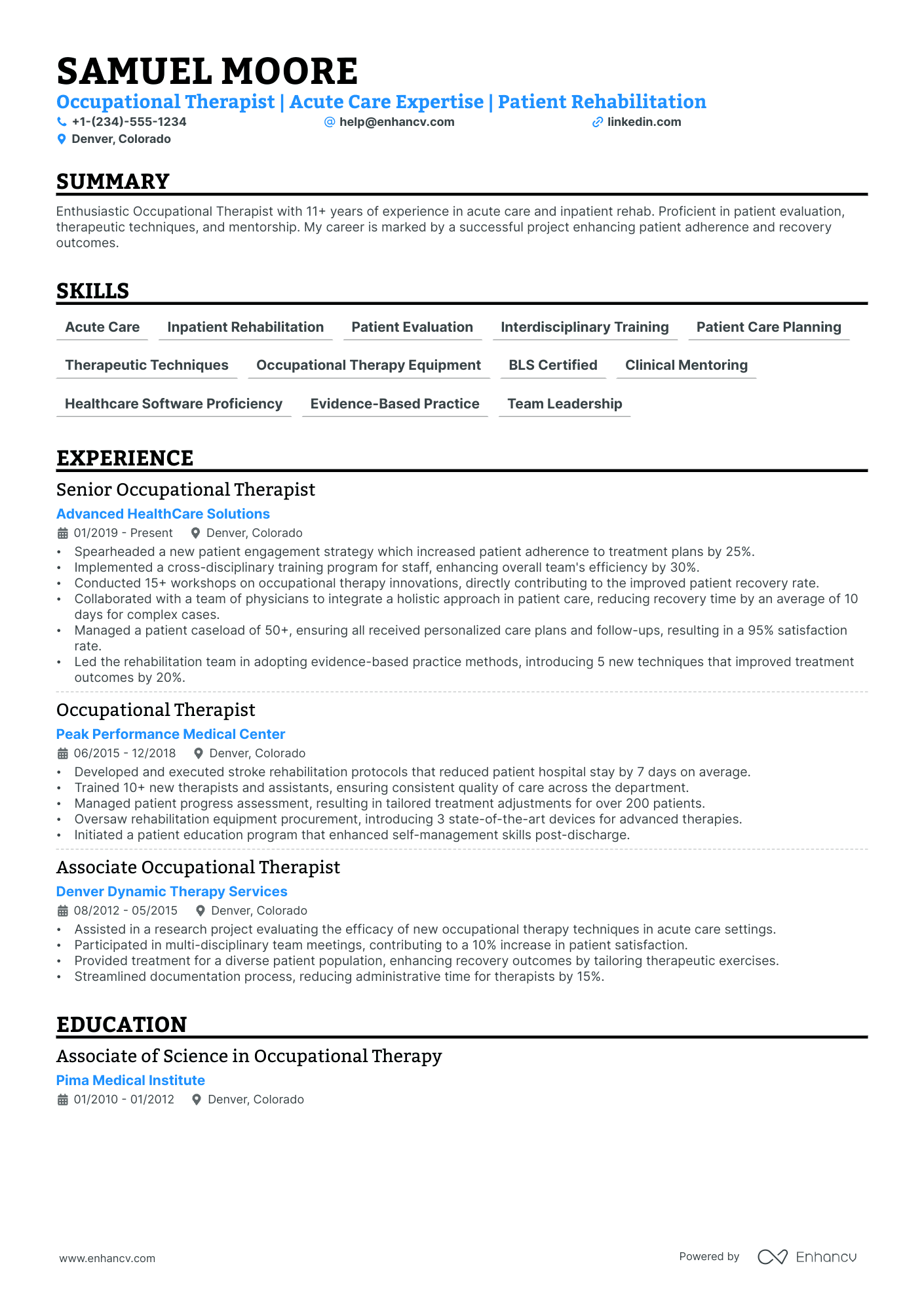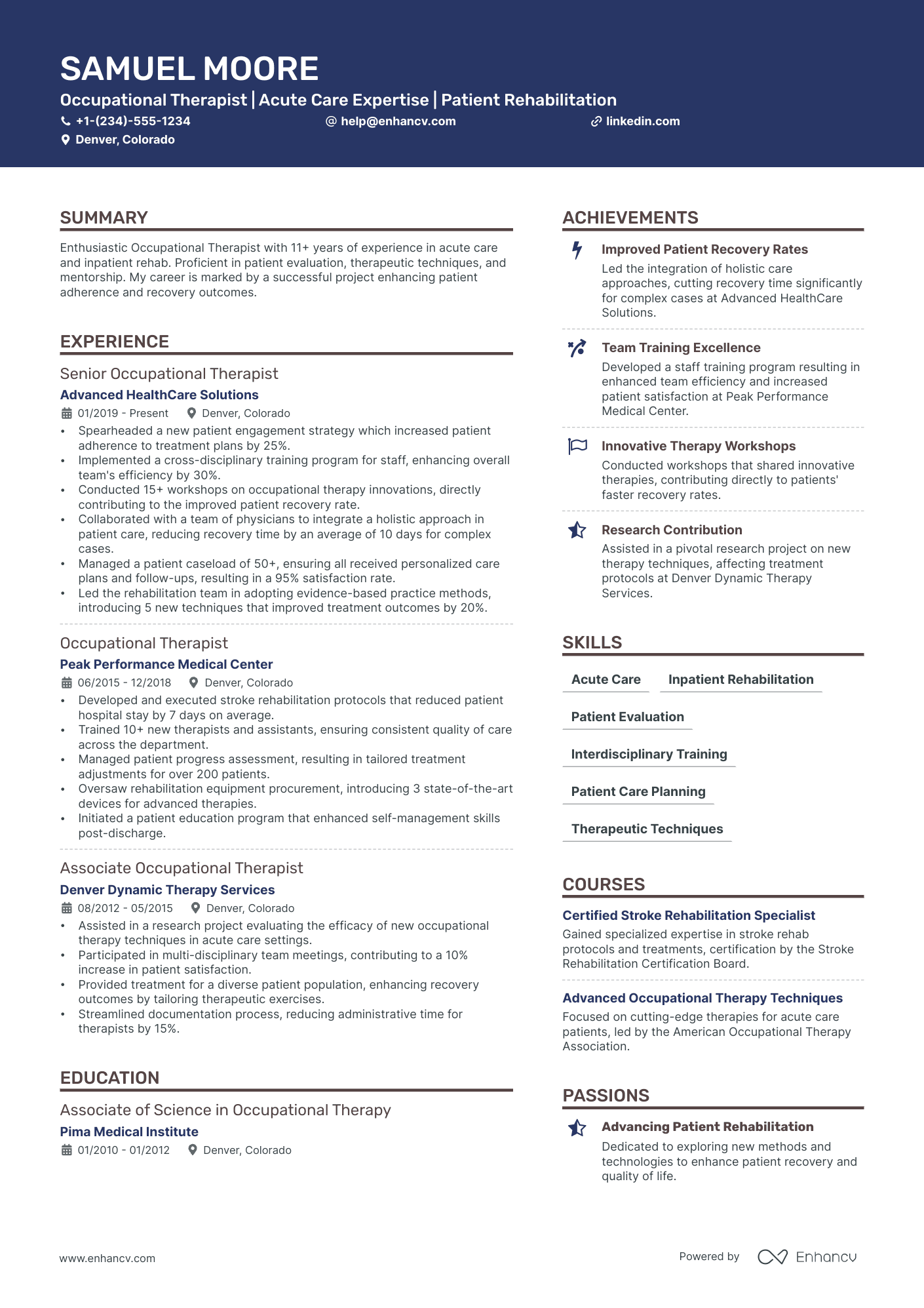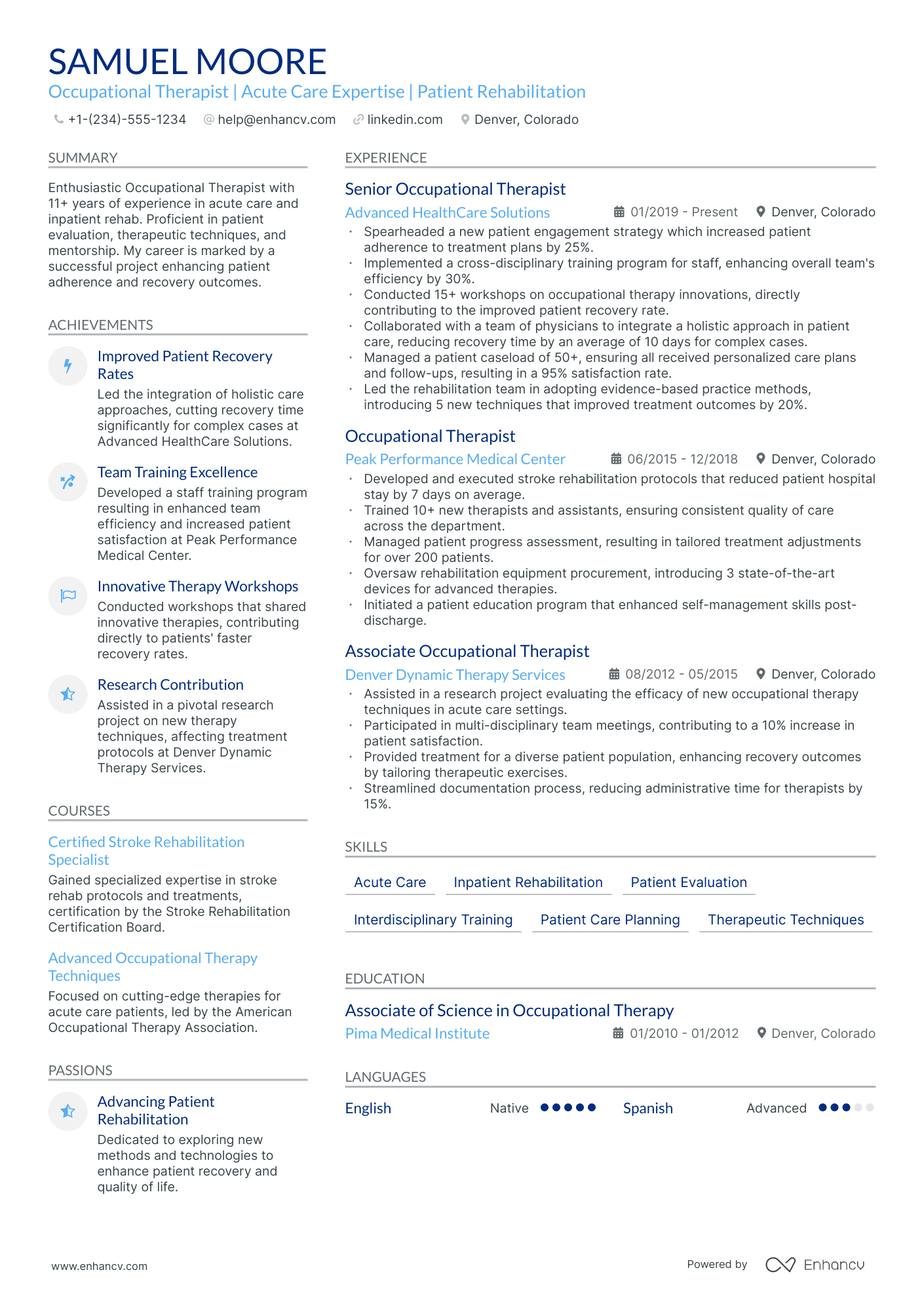As an occupational therapist, articulating the vast range of your patient care skills concisely on a resume can be a daunting challenge. Our guide will provide you with practical tips and examples to help you effectively showcase your expertise and stand out to potential employers.
- Sample industry-leading examples to learn how to write your best resume yet.
- Improve the experience, education, and achievements section of your resume with insights from resume-writing professionals.
- Curate your technical expertise and personality to stand out amongst the pool of candidates.
- Succinctly focus on your unique skill set all through your occupational therapist resume.
If the occupational therapist resume isn't the right one for you, take a look at other related guides we have:
Creating the best occupational therapist resume format: four simple steps
The most appropriate occupational therapist resume format is defined by precision and a systematic approach. What is more, it should reflect upon how your application will be assessed by recruiters. That is why we've gathered four of the most vital elements to keep in mind when designing your resume:
- It's all about presenting how your experience or skills align with the job. Use the reverse-chronological resume format , if your expertise is relevant to the occupational therapist role. Otherwise, select the functional skill-based resume format or the hybrid resume format to shift the focus to your skill set.
- Resume header - make sure you've filled out all relevant (and correct) information, like your contact details and link to your portfolio.
- Resume length - unless you've over a decade of applicable expertise in the field, stick with a one-page resume format. If you'd like to present more of your professional experience, go up to two pages.
- Resume file - submit your occupational therapist resume in a PDF format to ensure all information stays in the same place.
Upload & Check Your Resume
Drop your resume here or choose a file. PDF & DOCX only. Max 2MB file size.
PRO TIP
Always remember that your occupational therapist certifications can be quantified across different resume sections, like your experience, summary, or objective. For example, you could include concise details within the expertise bullets of how the specific certificate has improved your on-the-job performance.
Occupational therapist resume sections to answer recruiters' checklists:
- Header to help recruiters quickly allocate your contact details and have a glimpse over your most recent portfolio of work
- Summary or objective to provide an overview of your career highlights, dreams, and goals
- Experience to align with job requirements and showcase your measurable impact and accomplishments
- Skills section/-s to pinpoint your full breadth of expertise and talents as a candidate for the occupational therapist role
- Education and certifications sections to potentially fill in any gaps in your experience and show your commitment to the industry
What recruiters want to see on your resume:
- Relevant educational background and credentials, such as a Master's degree in Occupational Therapy and necessary certification/licensure (e.g., NBCOT).
- Hands-on experience with diverse populations and various settings (e.g., pediatric, geriatric, inpatient, outpatient, etc.).
- Proficiency in creating and implementing personalized treatment plans based on patient assessments.
- Knowledge of current rehabilitation equipment, assistive devices, and technology used in occupational therapy.
- Strong interpersonal and communication skills, highlighting experience with interdisciplinary teamwork and patient/family education.
Creating your occupational therapist resume experience to catch recruiters' attention
Remember that for the occupational therapist role, hiring managers are looking to see how your expertise aligns with their requirements. Here's where your resume experience section can help out. Make sure you:
- Include mainly roles that are relevant to the occupational therapist job you're applying for;
- Don't go too far back in your experience - recruiters will only care what you did a decade ago if it's really important for the occupational therapist role;
- Each bullet you include should say what you did, followed by the skills you used and the actual end result of your efforts;
- Quantify each of your achievements with numbers and possibly the overall effect it had on the organization;
- Highlight transferrable skills - or personal skills you've attained thanks to past jobs - that could be applicable within your potential workplace. This would showcase your unique value as a professional.
Formatting the experience section of your resume doesn't have to be an over-the-top deep dive into your whole career. Follow the occupational therapist resume examples below to see how industry-leading professionals are presenting their experience:
- Spearheaded a client-centered therapy program, enhancing patient outcomes by 35% through the innovative use of adaptive technology for rehabilitation.
- Managed a team of 10 junior therapists, providing mentorship and guidance to improve service delivery and patient satisfaction across the department.
- Formulated and executed an outpatient therapy initiative, which reduced readmission rates by 20% and streamlined the care transition process.
- Introduced an evidence-based, standardized assessment protocol that increased the accuracy of patient evaluations by 40%.
- Collaborated with interdisciplinary teams to integrate occupational therapy with overall patient care plans, leading to a reduction in treatment time by 25%.
- Championed occupational health and safety workshops, achieving a 30% decrease in workplace injuries among clients.
- Developed a specialty program in ergonomic assessments and interventions that improved patient workplace comfort and efficiency by 50%.
- Conducted research on the benefits of occupational therapy in geriatric patient care, leading to the creation of a new department service line.
- Generated a 60% improvement in treatment adherence by designing personalized activity-based interventions for patients with chronic conditions.
- Implemented a play-based therapy curriculum aimed at improving the developmental skills of children with disabilities, impacting over 120 cases.
- Worked cross-functionally to establish a family education program, which empowered caregivers and enhanced the home environment for therapeutic activities.
- Collaborated with the school system to integrate sensory integration strategies into classrooms, benefiting over 150 students.
- Designed an innovative teletherapy program for remote patients, which expanded the clinic's reach by 200 miles and increased patient enrollment by 25%.
- Advised on the implementation of assistive technology in rehabilitation, resulting in a 45% increase in patient independence for daily living activities.
- Led cross-functional training seminars to educate staff on the latest occupational therapy techniques and methodologies, ensuring a high standard of care.
- Orchestrated the development of a cognitive rehabilitation program, which improved patient cognitive function test scores by an average of 30%.
- Coordinated with interdisciplinary teams to refine discharge planning, reducing patient hospital stays by an average of 2 days.
- Pioneered a recovery model that integrated occupational therapy with vocational rehabilitation, assisting over 50 patients in returning to work.
- Optimized home visit protocols to increase the number of daily patient visits by 20%, while maintaining high satisfaction rates.
- Developed a fall prevention program for elderly patients, resulting in a 60% reduction in falls within the community serviced.
- Facilitated the acquisition and training on state-of-the-art home exercise equipment, which improved patient engagement by 75%.
- Launched a hand therapy program that enhanced post-surgical recovery times by 20%, successfully rehabilitating over 100 patients.
- Guided clinical research on the effectiveness of sensory integration therapy, which was published in a leading medical journal.
- Implemented patient experience feedback strategies that drove a 10% improvement in clinic reputation and patient retention.
- Developed a comprehensive stroke rehabilitation protocol, which was adopted by the network and decreased rehabilitation time by 15%.
- Actively participated in the training of new occupational therapy graduates, enhancing their practical skills and knowledge application.
- Piloted a technology-assisted therapy project that increased efficient delivery of care and was recognized with the clinic's Innovation Award.
- Directed the expansion of the occupational therapy department, which increased patient capacity by 30% without sacrificing care quality.
- Implemented a patient education initiative that improved long-term rehabilitation outcomes by fostering better lifestyle and ergonomic practices.
- Evaluated and customized patient treatment plans, incorporating feedback to continuously improve effectiveness and patient rapport.
Quantifying impact on your resume
- List the percentage increase in client retention or satisfaction you achieved through your therapeutic interventions.
- Quantify the number of clients you manage on average, to show your ability to handle a large and diverse caseload.
- Document the amount of money you saved the facility by introducing cost-effective treatment modalities or reducing the use of resources.
- State the number of interdisciplinary team meetings you’ve led or participated in, to showcase your collaboration skills.
- Highlight any improvements in treatment outcomes, using specific metrics, such as decreased pain levels or increased range of motion.
- Provide the volume of assessments and treatments you conducted over a given timeframe to demonstrate efficiency and expertise.
- Specify the size of the teams you have supervised or mentored, if applicable, to indicate your leadership experience.
- Mention any awards or recognition you've received, along with the number of recipients, to emphasize distinction in your field.
Action verbs for your occupational therapist resume
What if you don't have any experience?
There are two very common scenarios about candidates with less experience. They are either:
- Fresh out of college in search of a occupational therapist role
- Transferring over from a completely different field
Both of these types of candidates still have a shot at landing their first job in the industry.
All they need to do about the experience section of their occupational therapist resume is:
- Consider their strengths - would the outcomes of their previous roles or niche skill sets impress recruiters? Feature those towards the top of your resume
- Exclude any and all irrelevant experience items - remember that at the end of the day, you're telling a story that aims to align with the ideal candidate for the occupational therapist job
- Win recruiters over with personality - perhaps your ambition, dreams, and diligence would make you the perfect fit for the occupational therapist role. Dedicate resume space to detail your personality traits by showcasing how they've helped you succeed in past roles
- Tailor your experience to specific job requirements - ensure your occupational therapist resume answers the advert in the best way possible.
Recommended reads:
PRO TIP
Highlight any significant extracurricular activities that demonstrate valuable skills or leadership.
In-demand hard skills and soft skills for your occupational therapist resume
A vital element for any occupational therapist resume is the presentation of your skill set.
Recruiters always take the time to assess your:
- Technological proficiency or hard skills - which software and technologies can you use and at what level?
- People/personal or soft skills - how apt are you at communicating your ideas across effectively? Are you resilient to change?
The ideal candidate presents the perfect balance of hard skills and soft skills all through the resume, but more particular within a dedicated skills section.
Building your occupational therapist skills section, you should:
- List up to six skills that answer the requirements and are unique to your expertise.
- Include a soft skill (or two) that defines you as a person and professional - perhaps looking back on feedback you've received from previous managers, etc.
- Create up to two skills sections that are organized based on the types of skills you list (e.g. "technical skills", "soft skills", "occupational therapist skills", etc.).
- If you happen to have technical certifications that are vital to the industry and really impressive, include their names within your skills section.
At times, it really is frustrating to think back on all the skills you possess and discover the best way to communicate them across.
We understand this challenge - that's why we've prepared two lists (of hard skills and soft skills) to help you build your next resume, quicker and more efficiently:
Top skills for your occupational therapist resume:
Therapeutic modalities
Assistive technology
Rehabilitation software
Goniometers
Therapeutic exercise programs
Adaptive equipment
Electronic health records (EHR) systems
Manual therapy techniques
Splinting and orthotic fabrication
Functional assessment tools
Empathy
Communication
Problem-solving
Patience
Time management
Collaboration
Adaptability
Critical thinking
Motivational skills
Cultural competence
PRO TIP
Highlight any significant extracurricular activities that demonstrate valuable skills or leadership.
Showcase academic background with education and certifications' sections
Listing your education and certifications should be a rudimentary part of your resume writing.
Including your relevant academic background - in the form of your higher education degree and niche-specific certificates - will prove knowledge of the industry.
For your education section:
- Start by including your degree, followed by start and graduation dates, as well as the institution;
- You could include relevant coursework, major/minor , or GPA, only if your've just graduated from college or if this information would further support your application;
- If you have an "ongoing" degree, you can still list it in case you think your diploma can impress recruiters or it's required;
Follow a similar logic for your certifications section by listing the institution, alongside dates you've obtained the certificate. For some of the most recent and relevant industry certificates , check out the next part of our guide:
The top 5 certifications for your occupational therapist resume:
- National Board for Certification in Occupational Therapy (NBCOT) - NBCOT Certification
- Certified Hand Therapist (CHT) - Hand Therapy Certification Commission
- Assistive Technology Professional (ATP) - Rehabilitation Engineering and Assistive Technology Society of North America
- Physical Agent Modalities Practitioner (PAM) Certification - State-specific certifying bodies
- Driver Rehabilitation Specialist (DRS) - The Association for Driver Rehabilitation Specialists
PRO TIP
If the certificate you've obtained is especially vital for the industry or company, include it as part of your name within the resume headline.
Recommended reads:
The summary or objective: focusing on the top one-third of your resume
It's a well-known fact that the top one-third of your occupational therapist resume is the make-it-or-break-it moment of your application. The resume summary and objective could help you further build up your professional profile.
- If you have plenty of career highlights behind your back, use the resume summary . The occupational therapist summary immediately focuses recruiters' attention on what matters most within your experience.
- The resume objective is the perfect choice for balancing your career achievements with your vision. Use it to state precisely how you see yourself in a couple of years' time - as part of the company you're applying for.
Both the resume summary and resume objective can be your value pitch to potential employers: answering what makes your application unique and the top choice for the occupational therapist role. They both have to be specific and tailored - as there's no one-size-fits-all approach to writing your occupational therapist summary or objective. Use the occupational therapist examples below as a starting point:
Resume summaries for a occupational therapist job
- With over 10 years as a licensed occupational therapist in a pediatric clinical setting, I have honed the skills required for crafting individualized treatment plans and utilizing sensory integration techniques to facilitate children's growth. My dedication is evidenced by leading a team to win the 'Best Children's Therapy Service' award in 2021.
- After a successful 8-year career as a Special Education Teacher, I am eager to transition into Occupational Therapy, bringing extensive knowledge of child development and adaptive teaching methods. I am passionate about applying my skills in a new context to empower individuals with diverse needs.
- As a veteran occupational therapist with a focus on geriatric care, my 15 years of experience includes developing rehabilitation programs that enhance mobility and improve quality of life for the elderly. Proudly, I have been the lead OT in the groundbreaking community mobility project, improving home safety for over 200 seniors.
- Coming from a seasoned background in physical therapy and sports medicine, I am prepared to apply over 12 years of experience in human kinetics and rehabilitation to a career in Occupational Therapy. My commitment to patient care and rehabilitation success is coupled with a continued thirst for professional growth and contribution to therapeutic advancements.
- Seeking to apply a fresh perspective to the field of Occupational Therapy, my objective is to leverage my recent Master’s degree in Occupational Therapy and integrate evidence-based practices to assist clients in achieving optimal functioning and independence, despite having no professional experience yet.
- Eager to embark on my journey as an occupational therapist, I aim to utilize my academic achievements, including my recent graduation from an accredited Occupational Therapy program, along with my internships across various clinical settings, to deliver compassionate and effective interventions to clients in need.
More sections to ensure your occupational therapist resume stands out
If you're looking for additional ways to ensure your occupational therapist application gets noticed, then invest in supplementing your resume with extra sections, like:
These supplementary resume sections show your technical aptitude (with particular technologies and software) and your people skills (gained even outside of work).
Key takeaways
- Ensure your occupational therapist resume uses a simple, easy-to-read format that reflects upon your experience and aligns with the role;
- Be specific within the top one-third of your resume (header and summary or objective) to pinpoint what makes you the ideal candidate for the occupational therapist role;
- Curate information that is tailored to the job by detailing skills, achievements, and actual outcomes of your efforts;
- List your certifications and technical capabilities to demonstrate your aptitude with specific software and technologies;
- The sections you decide on including on your occupational therapist should pinpoint your professional expertise and personality.





